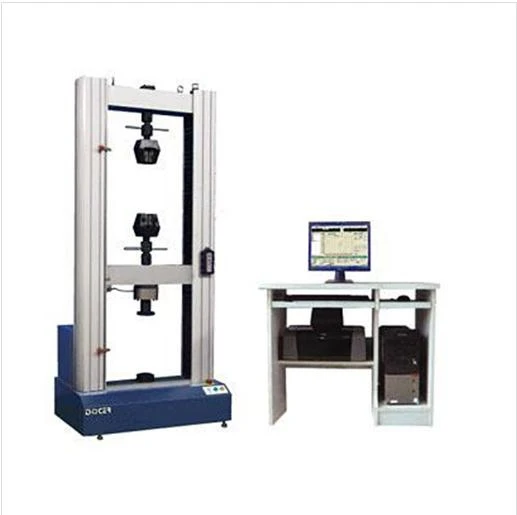tensile yield tester
Understanding the Tensile Yield Tester A Key Tool in Material Analysis
The tensile yield tester is an essential instrument in the field of material science and engineering, widely used to assess the mechanical properties of various materials. This article explores the importance of tensile testing, the mechanism of a tensile yield tester, and its applications across industries.
What is Tensile Testing?
Tensile testing is a fundamental method to determine how materials respond to tensile (pulling) forces. During a tensile test, a standardized specimen is subjected to a controlled stress until it either deforms or fractures. The results provide critical data about material properties, such as tensile strength, yield strength, elongation, and modulus of elasticity. These parameters are vital for engineers and designers to ensure that materials will perform adequately under specific loads and conditions.
The Mechanism of a Tensile Yield Tester
A tensile yield tester consists of several key components a loading system, a test specimen holder, a measurement system, and a data acquisition system. The test specimen, usually in the form of a dog-bone shape, is clamped securely in the holder. The loading system applies a continuous uniaxial tensile force while the measurement system monitors the elongation of the specimen.
As the load is applied, the tester records the stress (force per unit area) and strain (deformation relative to original length) in the specimen. The data is typically plotted on a stress-strain curve, allowing engineers to identify the yield point—the stress at which the material begins to deform plastically. Above this point, any deformation is permanent, which is a critical factor in material selection.
Importance in Various Industries
The tensile yield tester is crucial in several industries, including aerospace, automotive, construction, and manufacturing. In aerospace, for instance, materials must endure extreme stress and strain while maintaining their integrity. Therefore, comprehensive tensile testing ensures that materials used in aircraft components can withstand the rigors of flight.
tensile yield tester

In the automotive industry, tensile testing aids in the selection of materials that can absorb energy during crashes, thereby enhancing vehicle safety. Manufacturers utilize these tests to ensure that steel, aluminum, and composite materials meet industry standards for strength and durability.
In construction, tensile testing contributes to the safety and reliability of structural materials. Steel beams, cables, and reinforcements are subjected to tensile tests to confirm that they can bear the necessary loads, making it a critical aspect of engineering design and quality control.
Advances in Tensile Testing Technology
Recent advancements in technology have led to the development of more sophisticated tensile yield testers. Modern devices are equipped with digital interfaces, enabling automated data collection and analysis. Some devices now utilize extensometers, which provide precise measurements of strain during testing, allowing for more accurate determination of material properties.
Furthermore, software enhancements enable the creation of detailed reports and visualizations, streamlining the analysis process. These advancements ensure that engineers can make informed decisions based on accurate, real-time data.
Conclusion
The tensile yield tester is a cornerstone in material testing, providing invaluable insights into the mechanical properties of materials. By enabling engineers to assess the performance of materials under stress, it plays a vital role in enhancing safety and reliability across various industries. As technology continues to evolve, the capabilities of tensile yield testers are likely to expand, offering even more precise and efficient testing solutions. Understanding and utilizing this critical tool is essential for anyone involved in material selection and structural design, ensuring that the materials chosen will meet the specific demands of their applications.
In summary, tensile testing, facilitated by the tensile yield tester, is not just a procedure; it is an integral part of engineering that significantly impacts product development and safety across multiple fields.
-
Why the Conductor Resistance Constant Temperature Measurement Machine Redefines Precision
NewsJun.20,2025
-
Reliable Testing Starts Here: Why the High Insulation Resistance Measuring Instrument Is a Must-Have
NewsJun.20,2025
-
Flexible Cable Flexing Test Equipment: The Precision Standard for Cable Durability and Performance Testing
NewsJun.20,2025
-
Digital Measurement Projector: Precision Visualization for Modern Manufacturing
NewsJun.20,2025
-
Computer Control Electronic Tensile Tester: Precision and Power for the Modern Metal Industry
NewsJun.20,2025
-
Cable Spark Tester: Your Ultimate Insulation Assurance for Wire and Cable Testing
NewsJun.20,2025
 Copyright © 2025 Hebei Fangyuan Instrument & Equipment Co.,Ltd. All Rights Reserved. Sitemap | Privacy Policy
Copyright © 2025 Hebei Fangyuan Instrument & Equipment Co.,Ltd. All Rights Reserved. Sitemap | Privacy Policy
